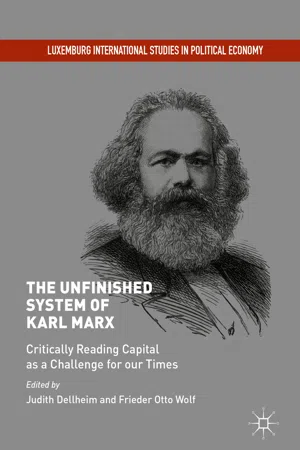Introduction6
This conviction of mine [i.e. that a reading of the history of Italian Marxisms should be given which is different from that underlying Cristina Corradi’s book (Corradi 2005)] is based, indeed, on the very distinction between Marxists and Marxians, which I consider to be decisive. This distinction is not chronological, as if in the 1970s everybody was a Marxist, while after that, out of the blue, the Marxians arrived and were welcomed. The truth is that such an authentically Marxian thread has, in fact, existed, and is defined by some crucial aspects. First, by a return to Marx’s original problems, which had been buried by Marxism: those linked to the monetary constitution of surplus value and those referring to the relinking of (new) value to (living) labour. And then, [second,]7 the absence [in Marx] of any separation between the ‘economic’ sides of these problems and those problems concerning their ‘philosophical’ and ‘sociological’ foundations. Finally, the attempt of taking up the enterprise of the critique of political economy again, in a non-dogmatic and unrepetitive way. This thread dates back, however, [and] has a long history throughout the twentieth century. In order to bring to light the traces of this development, it will be necessary to read the history of the discussion on Marx in a way very different from the one which has been practised until today.
1.1 I shall first declare, in a programmatic statement, which kind of reading I am interested in: a reading which is not claimed to be of any interest for others, and the method which I shall follow in my reconstruction may likewise be put into doubt. The aim of all this will be to take up the theory of Marx again as a full-fledged social science which is critical and unitary—as a critique of political economy which at the same time and as such will be critical economic politics and policy. Something in the face of which the distinctions—which have become so normal to us that we do not question them any more—between economics, sociology, and philosophy vanish completely or become insignificant. If seen clearly, those distinctions accordingly constitute an obstacle to an authentic knowledge of the very specific, particular object which capitalism is. In this theoretical effort, Marx evidently did not seek to create a watershed between theoretical interpretation and the terrain of practical intervention, almost as if he would have tried to divide ‘science’ from ‘revolution’ by dichotomy. This means, in my own case, that I am not interested in talking about Marx, if Marx is reduced to the status of a classic, but only if he seems to be effectively useful in understanding the tendencies of contemporary capitalism, in order to know how to fight against it, in order to understand how to take up a position on the terrain of politics—especially, with regard to my own profession, on that of the critique of economic politics.
On the terrain of methodology, I shall tell you a story of going backwards. This is something which goes counter to the many stories of how a pre-determined design was realised, as are repeatedly proposed in the history of Marxism, as well as for the many variants of it for which the plural of ‘Marxisms’ has been introduced. The book by Corradi still belongs to those histories of ‘design’. In those histories, Marx is first talked about as an origin, which is not yet (or at least only partially) corrupted—before the vicissitudes of a conceptual process are deployed which form the story of a loss, which is finally followed by the story of a return to the original Marx, recovering the fullness and wealth [of his thinking].
This is the result of a reading [of this history] which I just called into doubt, of the Marx who today becomes ‘ever more true’. This further ‘story of design’ still is—to my mind—a prisoner of that kind of Marxism which abhors any open problems: it is still a Marxism which seeks to dwell in the warm abode of (some) Marx without any contamination, without the critical ruptures which have [in actual fact] occurred within the very same Marx to whom this real abstraction has been referring.
I should better confess it immediately: my Marx forever and still is [and will be] the Marx of the theory of abstract labour, of the theory of value and of surplus value, of the theory of money—more precisely, of [the theory of] the monetary constitution of capitalist control [commando] over living labour, and of class struggle, after all, within the very heart of production. But I should also confess to the following: the very Marx to whom I turn back and whom I do not belittle in any way is a Marx full of problems [problematico], a Marx full of unresolved problems who is always busy trying to find new answers [to them]. Therefore, my Marx is a Marx whose labours are permanently going on. And for this very reason it is useful, and even essential, to write his history [as it were] ‘backwards’, and it will open totally new [inedite] perspectives. Making use of the metaphor of the spiral, rather than that of the circle, this gives us some responsibility—not only concerning the interpretation we offer, but ...
